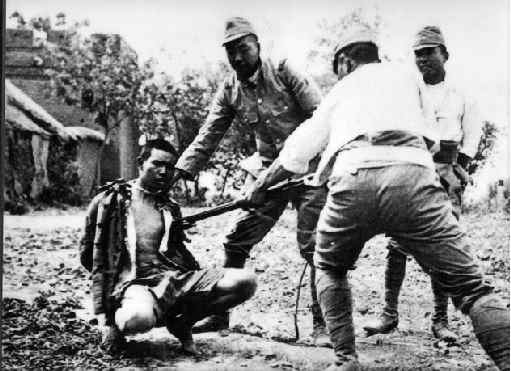 |
|
Japanese Bayonetting a Prisoner |
By
Tsee Yung Lee
Japan’s prime minister ignored world opinion and insisted on
worshipping convicted war criminals. The world should be worried.
Japanese Prime Minister Junichiro Koizumi have resumed an annual tradition
of visiting Tokyo’s Yasukuni shrine, in which 14 convicted class-A war
criminals, including wartime Prime Minister Hideki Tojo, and other war dead
are objects of worship. Prime Minister Koizumi argues that war criminals have
already been punished, so after death there is no need to distinguish between
those who died in battle and those executed for war crimes. Supporters claim
that the shrine has been dedicated to the country’s fallen soldiers since
its establishment in 1869.
They neglect to mention that the preeminent Shinto temple is a symbol of the
country’s prewar militarism. These criminals were practically smuggled into
Yasukuni in 1978 by shrine authorities, who recently published literature
accusing the 1947-50 international war trials as illegal. They also claim that
wars can never be criminal. Chancellor Shröeder pays respect to Germany’s
war dead, but he does not pay homage to those convicted in war crime trials.
South Korea has also protested the placement of plaques for the thousands of
slave laborers in the Shinto shrine - as servants of the Emperor to be
worshipped. Even the current foreign minister has advised the prime minister
not to go.
The shrine also symbolizes pre-1945 state theology, in which religion and
state were one. The Japanese Constitution asserts the separation of church and
state.
This is not the first time that the government has tried to whitewash its
role in enslaving millions of its neighbors, nor the first time it has tried
to justify its invasion of its neighbors by its need for natural resources.
The past two governments, in particular, have been reluctant to be as
forthright with their responsibilities. Two years ago, the Japanese parliament
adopted a national song and flag that were prominent during the war, Professor
Sakai of Asian Studies at Cornell University points out in an interview with
this writer. The symbolic message cannot be overemphasized. It is evident in
the severe punishments inflicted on teachers and students who refuse to bow to
the flag and sing along with the song during school ceremonies such as
commencements.
Japanese citizens are well versed in the country’s war history, thanks to
the great number of books dealing with the subject that have been published
over the decades, says Professor Sakai. But the government has angered many
countries by consistently trying to downplay its responsibility. Japan spends
more money on defense than any other country except the U.S. — a fact
American military hawks should take note of — yet it refuses to compensate
any surviving comfort women and former slaves.
In a 1995 statement, then-Prime Minister Tomiichi Murayama sought to heal
old wounds. “I express once more my heartfelt feelings of deep remorse and
state my heartfelt apology,” he said. But now, Koizumi, who even more so
than his late predecessor Obuchi is sympathetic to militarist feelings, said
in an interview with domestic media that Tokyo and its Asian neighbors should
emphasize the positive rather than focusing on spats. The two have also been
very grudging in offering any type of apologies, often referring to past
treaties instead.
 |
|
Japanese Hacking a Prisoner. |
World War II killed more people than any other conflict. Seventeen million
people died, over twenty-seven million were injured, and countless others saw
chaos or destruction of their homes. Japan maintains that a 1953 treaty with
the U.S. — and subsequent treaties with Asian countries that badly need its
cash — absolve its obligations to those whose lives it ruined. The U.S.
signed a treaty in San Francisco to keep biological and chemical warfare
secrets from the Soviet Union. But Japan’s infamous Unit 731 had obtained
those secrets from live, fully conscious human subjects. Besides, the San
Francisco treaty excluded sexual crimes, explains Professor Sakai.
Japan signed in 1965 a treaty with Korea that prevented Korean citizens
from filing claims against Japan. When it reestablished relations with China
in 1972, it included the same condition. Both treaties came with a large
amount of cash. Germany and its corporations have used private means to
compensate war survivors, however. Many Japanese favor such an option.
It is high time Prime Minister Koizumi comes to grips with his country’s
past. He should unequivocally and put in writing his acknowledgement of and
apology for its five decades of terrible human rights abuse. He should work
with war survivors to reach a settlement; many comfort women, for example,
were shunned or simply too traumatized after the war to lead a productive
life. He should make amends with its neighbors and come clean with what the
country did to the tens of thousands of Allied prisoners it so inhumanely
treated. It is time for the Japanese government to admit that it lost a war
that it should not have started, because if it refuses to learn from history,
it will, sooner or later, destroy itself once again. Western nations such as
the U.S. should bring pressure to spur such actions, because the price for not
acting is right before our eyes, in every American middle school’s social
studies textbook. |

